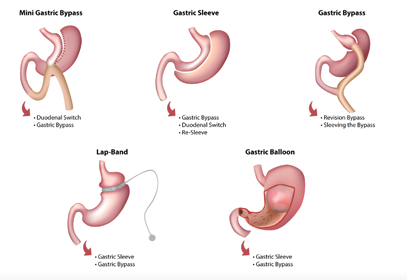Revisional Surgery refers to further surgery after a previous weight loss procedure. The two most common reasons a patient might consider revisional surgery are weight regain, or to improve a side effect such as reflux.
Revisional Surgery is a specialised area and is usually quite complex. This is because previous surgery distorts anatomy, creates scar tissue, involves embedded staple material, and alters the pattern of tissue blood supply. As a result, the cost for revisional surgery is higher due to the complex and specialised nature of the procedure, longer operative time, and greater expertise needed. A high degree of technical proficiency and many years surgical experience are absolutely essential in order to perform revisional surgery safely.
All revisional procedures are performed laparoscopically (keyhole surgery), using 4-5 small incisions. Depending on the degree of complexity, revisional procedures take between 1-3 hours; However despite the increased complexity, the post-operative recovery is still similar to primary surgery; You will be able to walk comfortably and drink a wide variety of fluids including coffee, juices and soup that afternoon, and one night in hospital is usually sufficient. You will be able to return to work and everyday life after 5-7 days.
Am I eligible?
Unlike first-time bariatric surgery, traditional Body Mass Index guidelines are not relevant for Revisional Surgery. If you have already had a weight loss procedure, and are experiencing difficulties or weight regain, then you are eligible for Revisional Surgery.
Revisional Surgery may be especially appropriate for you if you have regained a lot of weight after previous surgery (eg, you have regained more than half of the weight that you initially lost) or you are having issues with frequent regurgitation, reflux, indigestion or food intolerance.
We perform all types of revisional and corrective surgery at OClinic. Call us to discuss your particular situation and we will be happy to provide guidance and arrange a consultation with Dr Taylor to go through your history and discuss your options.
Some of our common revisional surgeries that we perform include conversion from:

- Gastric banding to a Sleeve or Bypass
- Sleeve to bypass
- Sleeve retightening
- ESG (Endoscopic Suture Gastroplasty) to sleeve or bypass
- Nissen Fundoplication to sleeve or bypass
- Stomach stapling (VBG) to sleeve or bypass
What are the risks of Revisional Surgery?
As with any surgery there are potential risks involved. Whilst most patients do not have any problems after Revisional Surgery, complications can sometimes occur, and occasionally be quite serious. Recovery and outcome usually depend on the patient’s existing health status. Whilst specific risks will greatly depend on the type of revisional surgery and the patient circumstances, as a general guide complications occur in up to 2-3% of patients including include leakage from staple lines or surgical joins (anastomoses), blood clots, infection, bleeding and anaesthetic complications.
These risks are, at least in theory, somewhat higher than first time surgery, due to scarring and changes to the blood supply of your stomach tissues, and this needs to be balanced against the benefits of improved weight control and/or overcoming complications or side effects of previous surgery.
